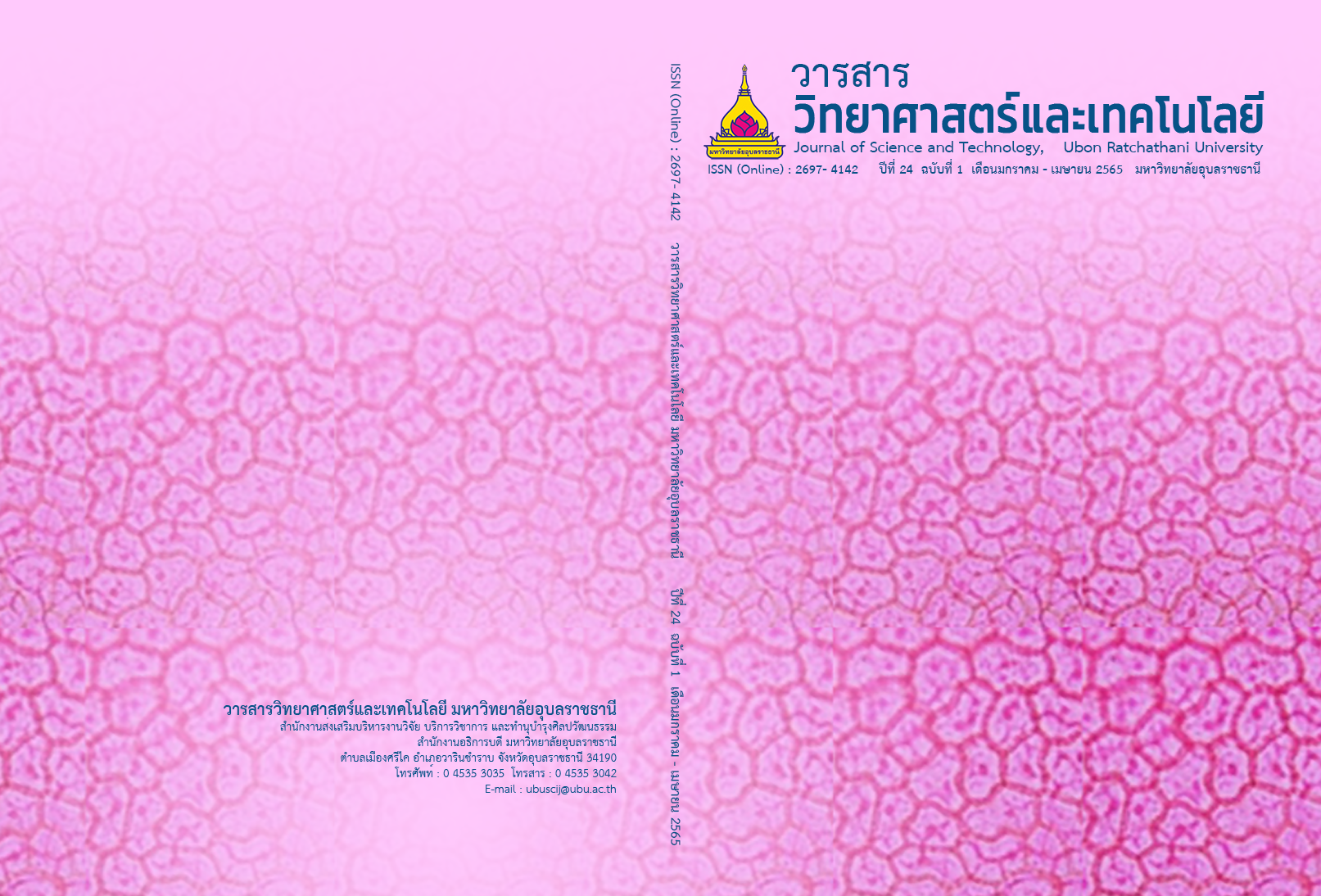ชนิดของคำภาษาไทยที่ส่งผลต่อประสิทธิภาพของแบบจำลองการจำแนกความคิดเห็น: กรณีศึกษาของความคิดเห็นของคนไทยต่อโรคโควิด 19
Main Article Content
บทคัดย่อ
งานวิจัยนี้มีวัตถุประสงค์เพื่อศึกษาผลกระทบของชนิดของคำภาษาไทยที่มีต่อประสิทธิภาพของแบบจำลองการจำแนกความคิดเห็นที่ใช้กับความคิดเห็นของคนไทยต่อโรคโควิด 19 จากสื่อสังคมออนไลน์ ข้อมูลความคิดเห็นเกี่ยวกับโรคโควิด 19 ที่เป็นข้อความภาษาไทยถูกเก็บจากเว็บไซต์ทวิตเตอร์ และพันทิป จำนวนทั้งหมด 2,920 ความความคิดเห็น แล้วนำกระบวนการเหมืองข้อความมาแบ่งข้อมูลออกเป็น 2 ชุดข้อมูล คือ คำวิเศษณ์ และคำกริยา ซึ่งเป็นคำที่บ่งบอกว่าข้อมูลเป็นความคิดเห็นเชิงบวก หรือเชิงลบ นอกจากนี้แล้วในงานวิจัยนี้ยังได้เพิ่มข้อมูลอีกหนึ่งชุด ซึ่งเป็นกลุ่มที่มีทั้งคำวิเศษณ์ และคำกริยา ดังนั้นจึงมีข้อมูลทั้งสิ้น 3 ชุด คือ ชุดข้อมูลที่มีแต่คำวิเศษณ์ ชุดข้อมูลที่มีแต่คำกริยา และชุดข้อมูลที่มีคำวิเศษณ์และคำกริยา เพื่อใช้ศึกษาผลกระทบของชนิดของคำไทยต่อประสิทธิภาพของแบบจำลองการจำแนกความคิดเห็น ในงานวิจัยนี้ได้นำ 5 เทคนิคมาสร้างแบบจำลอง ได้แก่ เทคนิคต้นไม้ตัดสินใจซี 4.5 (C4.5) เทคนิคนาอีฟเบย์ (NB) เทคนิคเคเนียร์เรสเนเบอร์ (KNN) เทคนิคเพอร์เซปตรอนแบบหลายชั้น (MLP) และเทคนิคระบบเรียนรู้เชิงลึก (DL) ในการทดสอบประสิทธิภาพของแบบจำลอง ได้ใช้ 10-โฟลด์ครอสวาลิเดชั่น เป็นวิธีการทดสอบ และใช้ความถ่วงดุล ความแม่นยำ ความครบถ้วน และค่าสัมประสิทธิ์สหสัมพันธ์แมทธิวส์ เป็นเกณฑ์ในการทดสอบ ผลการทดสอบพบว่าเทคนิค MLP มีค่าวัดประสิทธิภาพสูงสุดถึงร้อยละ 100 สำหรับทุกเกณฑ์การทดสอบเมื่อใช้ข้อมูลที่มีเฉพาะคำวิเศษณ์ และเทคนิค KNN มีประสิทธิภาพสูงสุดถึงร้อยละ 100 สำหรับทุกเกณฑ์การทดสอบเมื่อใช้ข้อมูลที่มีคำวิเศษณ์ และคำกริยารวมกัน งานวิจัยนี้ชี้ให้เห็นว่าชนิดของคำไทยส่งผลต่อประสิทธิภาพของแบบจำลองการจำแนกความคิดเห็น
Article Details

อนุญาตภายใต้เงื่อนไข Creative Commons Attribution-NonCommercial-NoDerivatives 4.0 International License.
บทความที่ได้รับการตีพิมพ์เป็นลิขสิทธิ์ของ วารสารวิทยาศาสตร์และเทคโนโลยี มหาวิทยาลัยอุบลราชธานี
ข้อความที่ปรากฏในบทความแต่ละเรื่องในวารสารวิชาการเล่มนี้เป็นความคิดเห็นส่วนตัวของผู้เขียนแต่ละท่านไม่เกี่ยวข้องกับมหาวิทยาลัยอุบลราชธานี และคณาจารย์ท่านอื่นๆในมหาวิทยาลัยฯ แต่อย่างใด ความรับผิดชอบองค์ประกอบทั้งหมดของบทความแต่ละเรื่องเป็นของผู้เขียนแต่ละท่าน หากมีความผิดพลาดใดๆ ผู้เขียนแต่ละท่านจะรับผิดชอบบทความของตนเองแต่ผู้เดียว
เอกสารอ้างอิง
Agarwal, V. and Sunitha, B.K. 2020. COVID-19 current pandemic and its societal impact. International Journal of Advanced Science and Technology. 29: 432-439.
Phumkhachorn, P. and Rattanachaikunsopon, P. 2020. Coronaviruses: Biological diasters from SARS and MERS to COVID-19. Journal of Science and Technology, Mahasarakham University. 39(6): 598-604. (in Thai)
Malik, M. and et al. 2018. A novel approach to web-based review analysis using opinion mining. Procedia Computer Science. 132: 1202-1209.
Somjettana, S. and Thongkam, J. 2021. Performance comparison of data mining techniques for building classification models of the Parent toward children who use smart phone. Journal of Science and Technology, Ubon Ratchathani University. 23(1): 21-30. (in Thai)
Phosaard, S. and Posawang, P. 2019. Classification for bus driver’s behaviors using text extraction and machine learning technique. Information Technology Journal. 15(1): 71-80. (in Thai)
Khunsuk, T. and Thongkam, J. 2020. Feature selection method for improving customer reviews classification, RMUTI Journal Science and Technology. 13(1): 129-143. (in Thai)
Supianto, A.A. and et al. 2018. Decision tree usage for student graduation classification: A comparative case study in Faculty of Computer Science Brawijaya University. In: Proceedings of the 2018 International Conference on Sustainable Information Engineering and Technology (SIET), 10-12 November 2018. Malang, Indonesia.
Chen, Y. and et al. 2017. A convolutional neural network for traffic information sensing from social media text. In: Proceedings of the 2017 IEEE 20th International Conference on Intelligent Transportation Systems (ITSC), 16-19 October 2017. Yokohama, Japan.
Suksangaram, W. and et al. 2018. Predicting learning organization factors that affect performance by data mining techniques. In: Proceedings of the 2018 International Joint Symposium on Artificial Intelligence and Natural Language Processing (iSAI-NLP), 15-17 November 2018. Pattaya, Thailand.
Pinmuang, N. and Thongkam, J. 2018. Classifying Thai opinions on online media using text mining. Journal of Science and Technology, Mahasarakham University. 37(3): 372-379. (in Thai)
Gupta, S. and et al. 2018. Opinion mining for hotel rating through reviews using decision tree classification method. International Journal of Advanced Research in Computer Science. 9(2): 180-184.
Thongkam, J. and Khunsuk, T. 2021. Translate Thai subtitles at anonymous. Journal of Industrial Technology, Ubon Ratchathani Rajabhat University. 11(1): 83-94. (in Thai)
Watchareewan, J. and Sunantha, S. 2017. Text classifcation analysis by stability comparison of algorithms. Sripatum Review of Science and Technology. 9(1): 19-31. (in Thai)
Hossain, T. and et al. 2017. Machine learning based class level prediction of restaurant reviews. In: Proceedings of the 2017 IEEE Region 10 Humanitarian Technology Conference (R10-HTC), 21-23 Dec 2017. Dhaka, Bangladesh.
Xu, X. and et al. 2020. Application of neural network algorithm in fault diagnosis of mechanical intelligence. Mechanical Systems and Signal Processing. 141: 1-13.


